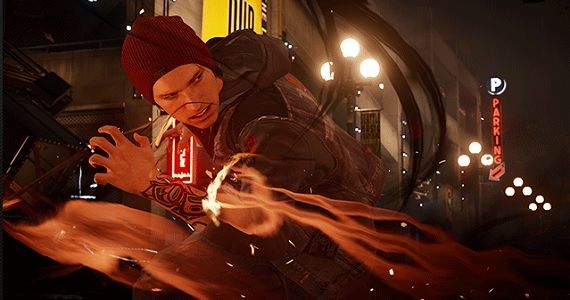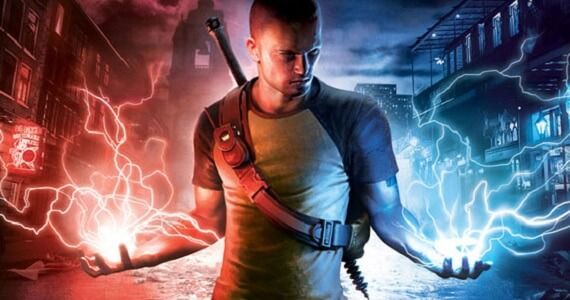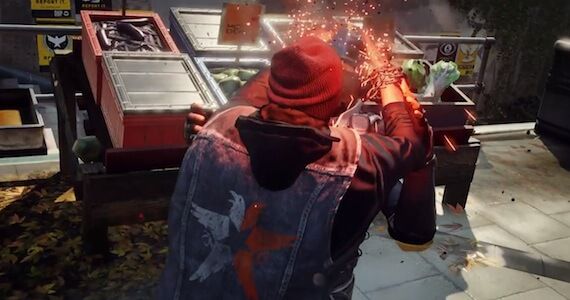The inFAMOUS games have, by virtue of being all about superpowers, a very comic book-inspired narrative and aesthetic, and one of the side-effects of this was the implementation of a binary moral choice system in which protagonist Cole McGrath could choose to become either a hero or a villain - a choice that was helpfully telegraphed to the people around him by his actions giving him either a red or a blue aura.
While it might fit with the style of inFAMOUS better than, for example, the Paragon/Renegade points fit into Mass Effect's narrative, this restrictive representation of ethics was the subject of some criticism in the reviews for the previous games.
With inFamous: Second Son introducing a brand new protagonist in the form of Delsin Rowe (Troy Baker), there have naturally been questions asked about whether or not Sucker Punch would continue the good/evil binary in terms of the ethical choices. Based on the outline of Second Son's morality given by creative director Nate Fox in an interview with PlayStation Magazine, it sounds like the introduction of a new character won't necessarily prevent inFAMOUS: Second Son from slipping into old habits. Does this sound familiar?
“When he gets powers, he becomes suddenly very high profile. People are horrified by him. He’s a bioterrorist, he’s out in the city where everybody wants to put him in a cage. But that means that his every action is noticed by people in the city, and even the world."
This was how Cole McGrath got started in inFAMOUS. After he unwittingly setting off a massive explosion that killed thousands and gave him superpowers, the residents of Empire City initially responded to Cole with fear and distrust, and the choices that the player makes will mean the difference between this response being compounded or counteracted.
Fox goes on to describe the morality of inFAMOUS: Second Son as one that is largely made up of "small choices" and designed to test the player's commitment to their path:
“Somebody might try to surrender to you in the middle of a fight and put their arms up. You could violently execute them or take them down alive. Do you know how hard it is to take down everyone alive? And when you do it, you feel like a superhero because you actually did the work.
"Choosing to be a good guy or a bad guy, that’s the simple choice. The harder thing to do is, are you capable of walking the walk? And that’s where the game comes alive in terms of karma in my mind."
Again, this sounds very similar to how things worked in the first two inFAMOUS games. Cole McGrath was sometimes able to merely stun enemies instead of killing them, and after doing so could restrain them for additional good karma. Alternatively, he could perform a "Wounded Kill" for a bit of evil XP, or even restrain them and then kill them to fulfil the requirements for "Execution." The idea that enemies can now surrender is interesting, though, as enemies in previous games were so committed to their job that they would literally fire a rocket at their own feet if it meant a shot at injuring Cole.
Another thing that hasn't changed is the lack of nuance. Cole can be a hero or an antihero, but he still can't be anything in between (at least, not if he wants to get the juiciest upgrades). There are branching paths to Delsin's story, but it sounds like there are still only two possible paths to take:
“Delsin is an all new character, part of an all-new story and the player gets in at ground zero. Second Son is Delsin’s origin story and because our game lets you choose if you want to be good or evil, you get to decide how he grows as a person and how the people around him are changed by his choices."
The main concern is that, as video games narratives continue to present increasingly complex portrayals of ethics and morality (see TellTale Games' The Walking Dead as a key example), binary moral choice systems are starting to seem outdated. Even Prototype, the direct genre competitor to the original inFAMOUS, presented a somewhat fascinating portrayal of the issue by having a protagonist whose actions are morally repugnant, but also presenting a clear justification as to why he lacks a conscience.
While it's a little disappointing to hear that the karma system won't have changed much in inFAMOUS: Second Son, it's impossible to judge it without first seeing it in action. Share your thoughts on binary moral choice systems with us in the comments - do they oversimplify a complex issue, or is there room for them in a comic book style series like inFAMOUS?
inFAMOUS: Second Son releases March 21, 2014 for the PS4.
-
Source: PlayStation Magazine



